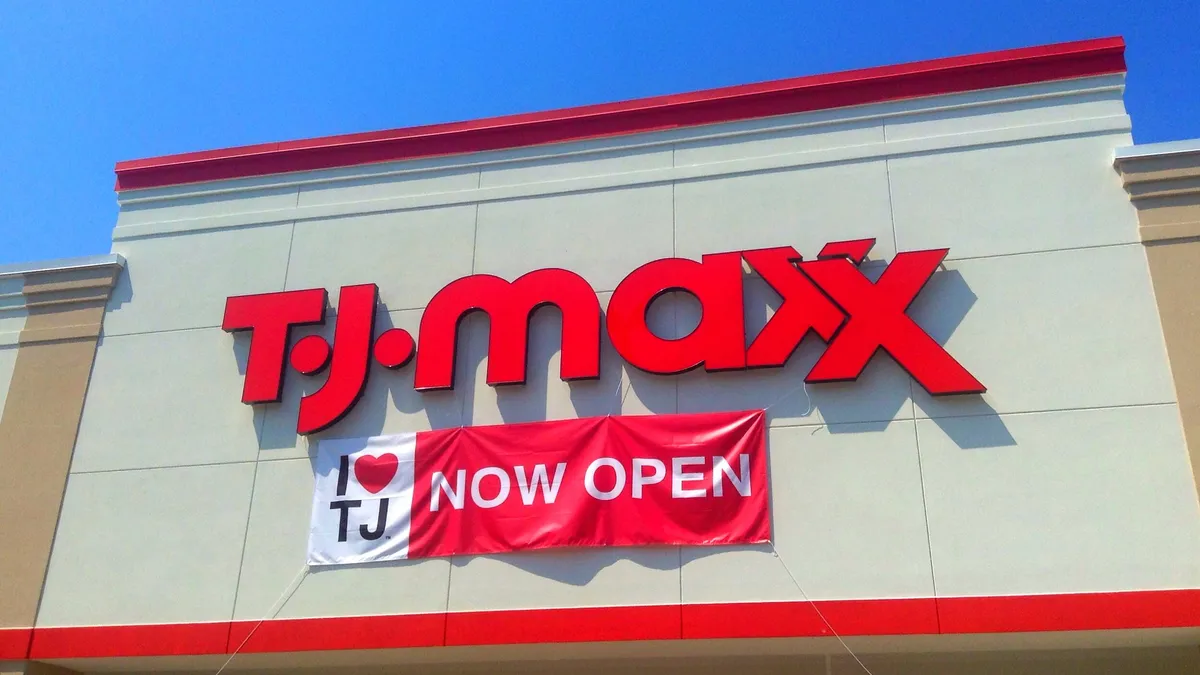Dive Brief:
- TJX Cos. posted a comparable sales increase of 13% (for open stores only) against the same period two years ago, before COVID-19 disrupted the off-price sector. Net sales, at $13.9 billion in Q4, were up 27% over last year and up 14% from two years ago.
- CEO Ernie Herrman said in a press release that sales had been trending higher in the quarter prior to surges across the country of the omicron variant of COVID-19.
- For the fiscal year, TJX's comp sales for open stores were up 17% from two years ago.
Dive Insight:
In a year marked by price hikes and supply chain disruptions, off-price and other discounters offered relief.
TJX was among the beneficiaries, with net sales for the entire year up 51% from last year. That's a testament both to TJX's strength and just how bad the pandemic — especially in 2020 — was for the off-price sector, which is heavily dependent on brick-and-mortar stores.
In the U.S., comp sales at the company's Marmaxx segment (which includes T.J. Maxx and Marshalls) were up 13% for the year, and HomeGoods' comps were up 32%.
All of this took place in a challenging operating environment. TJX ended the year with inventory values up by roughly $1 billion, to $6 billion, due mainly to higher transit times. Herrman praised the company's teams for ensuring "a consistent flow of exciting merchandise for our customers this holiday season and throughout the year."
The difficulties of the year can be seen in TJX's profit margin, which was down by 1.9 percentage points compared to two years ago, to 9% (pre-tax). While lowered markdowns helped the bottom line, TJX's merchandise margin was down 2.8 percentage points because of higher freight costs. Investments in distribution capacity and wages also lowered the company's margins.
Still, judging by its sales, the retailer's stores were well-stocked for the holiday season. "The common theme across all parts of the US business is the ability of TJX to maintain healthy inventory levels and to offer compelling assortments even in the face of supply chain disruption," Neil Saunders, GlobalData managing director, said in emailed comments.
That, Saunders added, "comes down to skill in buying and the deep connections the company’s buyers have with various sources across retail, wholesale and manufacturing. This has always been a point of strength, but it is now coming into its own during a time of supply constraints and disruption."
TJX's earnings as well as its sales — despite the increases — fell short of analyst estimates. "The sales and earnings miss for the quarter is disappointing, reflecting the global macro operational challenges even for high quality operators," Telsey Advisory Group analysts said in a note, and pointed to TJX's exposure to consumer hesitance over omicron as well as freight and other cost pressures.
But the analysts also pointed to consumers' underlying appetite for the off-price concept, as did MKM Partners Managing Director Roxanne Meyer, who noted the "highly transient nature of the factors impacting TJX and our ongoing favorable structural view that off-price and TJX specifically remain well-positioned for longer-term global share gains."
While cost inflation hurt, the larger economic environment may work to the retailer's favor at the same time. As Saunders noted, "The inventory shortages and a distinct lack of generous discounts across much of mainstream retail, at a time when more consumers were price-sensitive, pushed people to off-price."
















